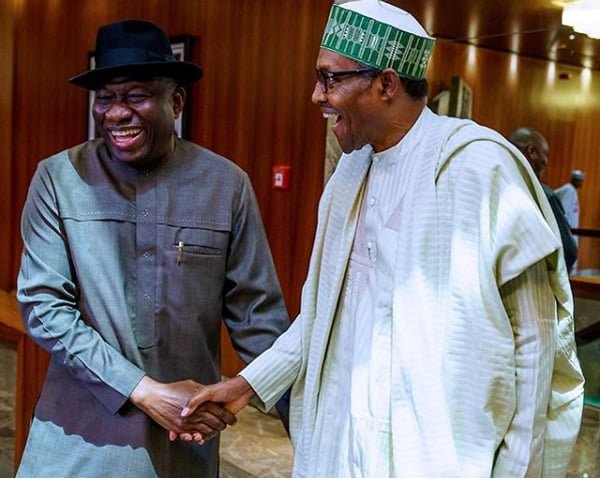Former Nigerian President, Goodluck Jonathan, has disclosed that Boko Haram insurgents once nominated ex-President Muhammadu Buhari to negotiate on their behalf during peace talks with the Federal Government.
Jonathan made the revelation on Friday at the public presentation of Scars, a book authored by former Chief of Defence Staff, General Lucky Irabor (rtd), in Abuja.
The former president said his administration set up multiple committees in search of dialogue with the deadly sect, and in one of such attempts, the insurgents specifically named Buhari as their preferred negotiator.
Jonathan noted that because of that development, he initially assumed Buhari, who later became president in 2015, would have been able to reach a quick settlement with the terrorists.
“One of the committees we set up then, the Boko Haram nominated Buhari to lead their team to negotiate with the government. So I was feeling that, oh, if they nominated Buhari to represent them and have a discussion with the government committee, then when Buhari took over, it could have been an easy way to negotiate with them and they would have handed over their guns. But it was still there till today,” Jonathan said.
He stressed that the failure of Buhari to end Boko Haram despite that advantage proved that the insurgency was far more complex than many Nigerians assume.
Read also:
- From Chibok to American Dream: Boko Haram escapee Joy rebuilds life, marries in U.S.
- Troops foil Boko Haram/ISWAP attack on naval base at Lake Chad
- Zulum visits families of 63 killed in Boko Haram attack in Borno Community
“I thought that after I left, within a reasonable time, General Buhari would wipe them out. But even today, Boko Haram is still there. The issue of Boko Haram is far more complex than it is often presented,” Jonathan added.
The former president, who battled the insurgency throughout his five-year tenure, said Boko Haram’s activities could not be explained away by poverty or hunger, noting that the group’s sophisticated weaponry clearly pointed to external sponsorship.
Jonathan also revisited the April 2014 abduction of over 200 schoolgirls from Chibok, Borno State, describing it as “a permanent scar” on his administration.
“It is a scar I will die with,” he said, adding that he hoped one day Boko Haram leaders would document their own accounts just like key actors of the Nigerian Civil War did, so Nigerians could finally understand the group’s true motives.
He further urged the Bola Tinubu administration to explore a carrot-and-stick strategy in dealing with the insurgency, stressing that new approaches were required.
“Look at the weapons they use, and you value the weapons, then you know these are not hungry people. Sometimes they even have more ammunition than our soldiers. Where are these sophisticated weapons coming from? You begin to see that external hands are also involved,” Jonathan said.






